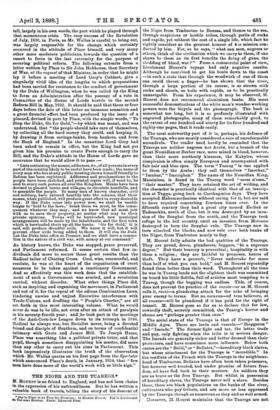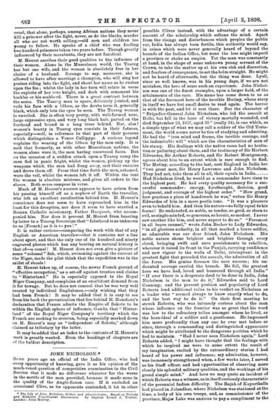11:th NIGER AND THE TUAREGS.*
M. HOURST is no friend to England, and has not been choice in the expression of his unfriendliness. But he has written a valuable book of travels, telling the story of his descent of • Sur te Niger et au Paus des Tomaregs la Mission Murat. Per le Lieutenant de Vai /eau Honrat. Paris: LiLrairie Pion.
the Niger from Timbuctoo to Boussa, and thence to the sea. through suspicions or hostile tribes, through perils of rocks and rapids, yet without the cost of a single life, which fact he rightly considers as the greatest honour of tie mission con- ducted by him. For, as he says, "what can men, negroes or others, think of the civilisation which we carry to them, if one shows to them as its first benefits the firing of guns, the shedding of blood, war ?" From a commercial point of view,. Lieutenant Hourst's voyage had only negative results. Although he contrived to get his boats down to the coast —in such a state that through the woodwork of one of them one could thrust a finger—he has shown that the river, through a large portion of its course, is so strewn with rocks and shoals, so boils with rapids, as to be practically unnavigable. From his experience, it may be observed, M. /fount does not recommend aluminium boats. His most successful demonstrations of the white man's wonder-working powers were the bicycle and the phonograph. The book is somewhat too long, but it is so profusely illustrated with engraved photographs, many of them remarkably good, to the extent of one hundred and ninety for its four hundred and eighty-one pages, that it reads easily.
The most noteworthy part of it is, perhaps, his defence of the Tuarege, who are mostly considered a race of unredeemable scoundrels. The reader need hardly be reminded that the Tuaregs are neither negroes nor Arabs, but a branch of the great Numidian or Berber race, more mixed in blood, however, than their more northerly kinsmen, the Kabyles, whose complexion is often simply European and accompanied with fair hair and blue eyes. The term " Tuareg " is one applied to them by the Arabs ; they call themselves " Imochar," " Imuhar," " Imazighen." The name of the Numidian King,. Massinissa, is found in the Tuareg word "mess n'esen," "their master." They have retained the art of writing, and, the character is practically identical with that of an inscrip- tion at Togga, going back to Carthaginian days. They have Mahommedanism without caring for it, but are said to have required converting fourteen times over. In the fifteenth century they had a great city named Es-Sak or Tademekka, north of Gao, but it was destroyed by an inva- sion of the Songhai from the south, and the Tuaregs took refuge in the hill country, until an invasion from Morocco, destroyed in turn the Songhai rule. The Tuaregs now in, turn attacked the blacks, and now rule over both banks of the Niger, from Timbuctoo nearly to Say.
M. burst fully admits the bad qualities of the Tuaregs. They are proud, fierce, plunderers, beggars, "to a supreme degree." But their bravery is proverbial ; hospitality is with them a religion ; they are faithful to promises, haters of theft. They have a proverb, "Never undertake for more than half of what you can hold," and M. Hourst repeatedly found them better than their word. Throughout all the time he was in Tuareg lands not the slightest theft was committed on board his little flotilla, fall of articles most tempting to a, Tuareg, though the begging was endless. This, of courser does not prevent the practice of the razzia—or as M. Hourst calls it, razzi—a plundering attack for the sake of bringing your enemy to terms. But no caravan—of true believers, at all events—will be plundered if it has paid for the right of transit. M. Hourst goes so far as to declare that for low, cowardly theft, secretly committed, the Tuareg's horror and shame are "perhaps greater than ours."
The social state of the Tuaregs is that of Europe in the Middle Ages. There are lords and vassals,—" Ihaggaren"' and "Imrads." The former fight and tax, the latter trade and pay, only fighting when the tribe is in serious danger. The 'wads are generally richer and better dressed than their protectors, and have sometimes more influence. Below both castes are the "Belle," or " Bellates,"—hereditary black slaves, bat whose attachment for the Tuaregs is "incredible." In the conflicts of the French with the Tuaregs in the neighbour- hood of Timbuctoo, Bellates have often been taken prisoners, but however well treated, and under promise of future free- dom, all have fled back to their masters. As soldiers they are as brave as the free Taaregs. But whilst, in possession of hereditary slaves, the Tuaregs never sell a slave. Besides these, there are black populations on the banks of the river, cultivators who pay tribute, and are more or less oppressed by the Tuaregs, though as numerous as they and as well armed.
Lloreover, U. burst maintains that the Tuaregs are not cruel, that alone, perhaps, among African nations they never kill a prisoner after the fight, never, as do the blacks, murder all who are not worth selling,—old men and children too young to follow. He speaks of a chief who was feeding two hundred prisoners taken two years before. Though greatly influenced by their marabouts, they are not fanatical.
M. Hourst ascribes their good qualities to the influence of their women. Alone in the Mussulman world, the Tuareg has but one wife, and the woman is absolutely free in her choice of a husband. Strange to say, moreover, she is allowed to have after marriage a champion, who will sing her praises riding into the fight, and shout her name as he rushes upon the foe ; whilst the lady in her turn will relate in verse the exploits of her true knight, and deck with ornament hie buckler or his scabbard. There is a great contrast between the sexes. The Tuareg man is spare, delicately jointed, and
veils his face with a lithant, as the Arabs term it, generally black, which only lets the eyes be seen. The Tuareg woman is unveiled. She is often very pretty, with well-formed nose, large expressive eyes, and very long black hair, parted on the
forehead and bound in a long tress behind. But, alas ! women's beauty in Tuareg eyes consists in their fatness, especially—well, in reference to that part of their persons -which distinguishes a Venus Callipyge. A curious legend
explains the wearing of the litham by the men only. It is said that formerly, as with other Mussulman nations, the
women alone wore it, the men having uncovered faces. But on the occasion of a sudden attack upon a Tuareg camp the men fled in panic fright, whilst the women, picking up the weapons which the men had flung away, met their enemies and drove them off. From that time forth the men, ashamed, wore the veil, whilst the women left it off. Within the tent the woman is absolute mistress, and gives all orders to the slaves. Both sexes compose in verse.
Much of M. bourses success appears to have arisen from his passing himself off as a nephew of Barth the traveller, who left an excellent recollection behind him. M. Hourst's conscience does not seem to have reproached him in the least for this deception, nor does it seem to have startled a Roman Catholic missionary, Father Hacquart, who accom- panied him. Nor does it prevent M. Hourst from boasting by letter to a Tuareg Sovereign that "falsehood is as unknown to us [French] as it is to you!"
It is rather curious—comparing the work with that of any English or American traveller—that it contains not a line about sport, and that the only one of its hundred and ninety engraved photos which has any bearing on natural history is that of—a camel! M. Hourst does not even give a picture of eome "colossal" fish, which, swimming against the current of the Niger, made the pilot think that the expedition was in the midst of shoals !
M. Hourst takes up, of course, the newer French ground of ‘` effective occupation," as a set-off against treaties and claims to "Hinterland." He is especially opposed to the Royal
Niger Company, and complains of an exorbitant demand from it for towage. But he does not conceal that he was very well treated by individual Englishmen,—only wishing that they had been French ! It may be added that it is easy to see from his book the prevarication that lies behind M. Hanotanx's declaration that France admits the Empire of Sokoto to be within the English sphere of influence, Gando, that "Hinter- land" of the Royal Niger Company's territory which the French are seeking to overran, being especially marked down on M. Hourst's map as "independent of Sokoto," although claimed as tributary by the latter.
It may be added that an index to the contents of M. Hourst's work is greatly wanted. Even the headings of chapters are of the baldest description.



































 Previous page
Previous page